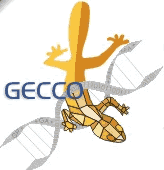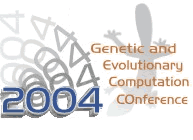

June 26 - 30, 2004
Saturday to Wednesday
Seattle, Washington, USA
Session: |
LBP - Late Breaking Papers |
Title: |
Equilibrium and Extinction In a Trisexual Diploid Mating System |
Authors: |
Erik Buehler |
Abstract: |
In order to study the dynamics of a three-sex (trisexual) mating system, we extend the heterogametic sex-determining mechanism, used in many species, to include three sexes: XX, XY and YY. In this model, non-like types may mate, but like-types may not mate. We compare the dynamics of this system to a Mendelian system under Hardy-Weinberg conditions, and coin the term Trisexual Equilibrium to describe a system state very similar to Hardy-Weinberg Equilibrium. We construct computer simulations and mathematical models in an attempt to quantify the system's dynamics, and conclude that three-sex systems are not stable over time; they are destined to converge to two-sex systems. This conclusion is based on the fact that the less-represented homozygote's frequency variance (between adjacent generations) is positively linearly proportional to the respective frequency its self. |
HomeProgramSearchAuthor Index
SponsorsCommitteeContact Us
